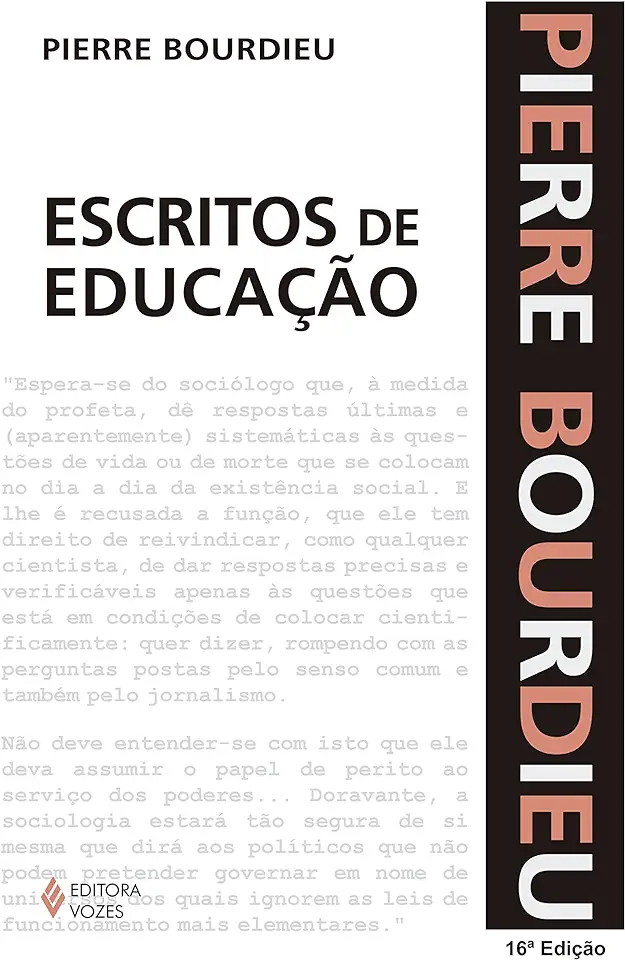
Writings on Education - Pierre Bourdieu
Writings on Education: Pierre Bourdieu
A Profound Exploration of Education and Social Reproduction
In his seminal work, "Writings on Education", Pierre Bourdieu presents a groundbreaking analysis of the role of education in perpetuating social inequality. Through a series of insightful essays, Bourdieu argues that education is not simply a neutral institution that provides equal opportunities for all, but rather a powerful mechanism that reproduces and legitimizes existing social hierarchies.
Education as a Form of Cultural Capital
Bourdieu's central thesis is that education functions as a form of cultural capital, a set of socially valued knowledge, skills, and dispositions that are unequally distributed across society. This cultural capital is acquired primarily through family background and social class, and it plays a crucial role in determining an individual's educational and life chances.
Bourdieu argues that the education system is structured in a way that favors students from privileged backgrounds, who possess the cultural capital that is valued by schools and universities. These students are more likely to succeed academically and gain access to higher education, which in turn leads to better jobs and higher social status.
The Hidden Curriculum of Education
Bourdieu also draws attention to the hidden curriculum of education, the unspoken rules and norms that shape the educational experience. These include the ways in which knowledge is presented, the values that are emphasized, and the expectations that are placed on students.
Bourdieu argues that the hidden curriculum often reflects the values and interests of the dominant social class, and it serves to perpetuate existing social inequalities. For example, the emphasis on standardized testing and academic achievement may favor students from families with the resources to provide private tutoring and test preparation, while disadvantaging students from less privileged backgrounds.
Education and Social Change
Bourdieu's work has had a profound impact on the field of sociology of education, and it continues to be a source of inspiration for scholars and policymakers alike. His analysis of education as a form of cultural capital and his critique of the hidden curriculum have challenged traditional notions of equality of opportunity and have opened up new avenues for understanding the role of education in social reproduction.
Bourdieu's work is essential reading for anyone interested in understanding the complex relationship between education and social inequality. It is a powerful indictment of the current education system and a call for transformative change.
Key Themes in "Writings on Education"
- Education as a form of cultural capital: Bourdieu argues that education is not simply a neutral institution that provides equal opportunities for all, but rather a powerful mechanism that reproduces and legitimizes existing social hierarchies.
- The hidden curriculum of education: Bourdieu draws attention to the hidden curriculum of education, the unspoken rules and norms that shape the educational experience. He argues that the hidden curriculum often reflects the values and interests of the dominant social class, and it serves to perpetuate existing social inequalities.
- Education and social change: Bourdieu's work has had a profound impact on the field of sociology of education, and it continues to be a source of inspiration for scholars and policymakers alike. His analysis of education as a form of cultural capital and his critique of the hidden curriculum have challenged traditional notions of equality of opportunity and have opened up new avenues for understanding the role of education in social reproduction.
Why You Should Read "Writings on Education"
"Writings on Education" is a must-read for anyone interested in understanding the complex relationship between education and social inequality. It is a powerful indictment of the current education system and a call for transformative change.
Bourdieu's work is essential reading for:
- Educators: Bourdieu's analysis of the hidden curriculum and the role of cultural capital in education provides valuable insights for educators who are committed to creating more equitable and inclusive learning environments.
- Policymakers: Bourdieu's work offers a critical perspective on the current education system and the need for systemic change. His insights can help policymakers develop more effective policies that promote equal opportunities for all students.
- Researchers: Bourdieu's work is a rich source of inspiration for researchers interested in the sociology of education and social inequality. His theoretical framework and empirical research have opened up new avenues for understanding the complex relationship between education and society.
Conclusion
"Writings on Education" is a seminal work that has had a profound impact on the field of sociology of education. Bourdieu's analysis of education as a form of cultural capital and his critique of the hidden curriculum have challenged traditional notions of equality of opportunity and have opened up new avenues for understanding the role of education in social reproduction.
This book is essential reading for anyone interested in understanding the complex relationship between education and social inequality. It is a powerful indictment of the current education system and a call for transformative change.